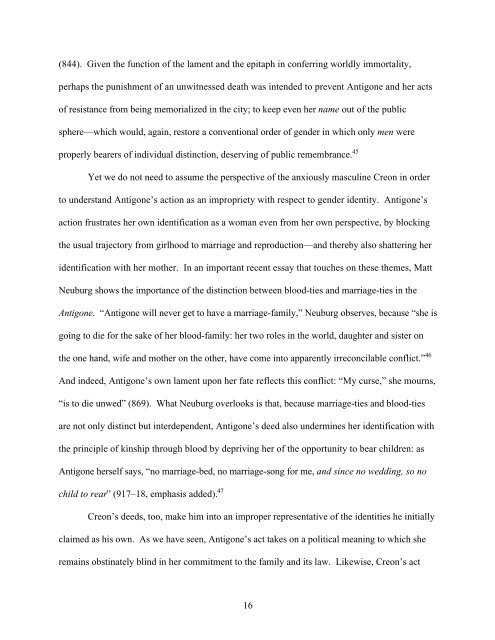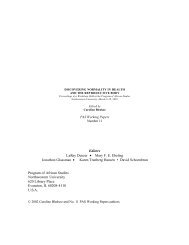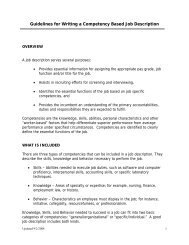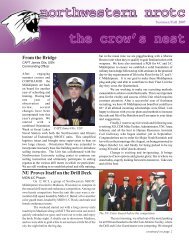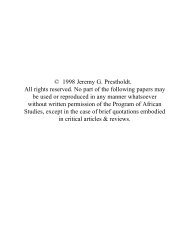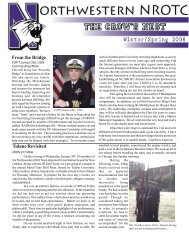TRAGIC RECOGNITION: ACTION AND IDENTITY IN ANTIGONE ...
TRAGIC RECOGNITION: ACTION AND IDENTITY IN ANTIGONE ...
TRAGIC RECOGNITION: ACTION AND IDENTITY IN ANTIGONE ...
You also want an ePaper? Increase the reach of your titles
YUMPU automatically turns print PDFs into web optimized ePapers that Google loves.
(844). Given the function of the lament and the epitaph in conferring worldly immortality,<br />
perhaps the punishment of an unwitnessed death was intended to prevent Antigone and her acts<br />
of resistance from being memorialized in the city; to keep even her name out of the public<br />
sphere—which would, again, restore a conventional order of gender in which only men were<br />
properly bearers of individual distinction, deserving of public remembrance. 45<br />
Yet we do not need to assume the perspective of the anxiously masculine Creon in order<br />
to understand Antigone’s action as an impropriety with respect to gender identity. Antigone’s<br />
action frustrates her own identification as a woman even from her own perspective, by blocking<br />
the usual trajectory from girlhood to marriage and reproduction—and thereby also shattering her<br />
identification with her mother. In an important recent essay that touches on these themes, Matt<br />
Neuburg shows the importance of the distinction between blood-ties and marriage-ties in the<br />
Antigone. “Antigone will never get to have a marriage-family,” Neuburg observes, because “she is<br />
going to die for the sake of her blood-family: her two roles in the world, daughter and sister on<br />
the one hand, wife and mother on the other, have come into apparently irreconcilable conflict.” 46<br />
And indeed, Antigone’s own lament upon her fate reflects this conflict: “My curse,” she mourns,<br />
“is to die unwed” (869). What Neuburg overlooks is that, because marriage-ties and blood-ties<br />
are not only distinct but interdependent, Antigone’s deed also undermines her identification with<br />
the principle of kinship through blood by depriving her of the opportunity to bear children: as<br />
Antigone herself says, “no marriage-bed, no marriage-song for me, and since no wedding, so no<br />
child to rear” (917–18, emphasis added). 47<br />
Creon’s deeds, too, make him into an improper representative of the identities he initially<br />
claimed as his own. As we have seen, Antigone’s act takes on a political meaning to which she<br />
remains obstinately blind in her commitment to the family and its law. Likewise, Creon’s act<br />
16


